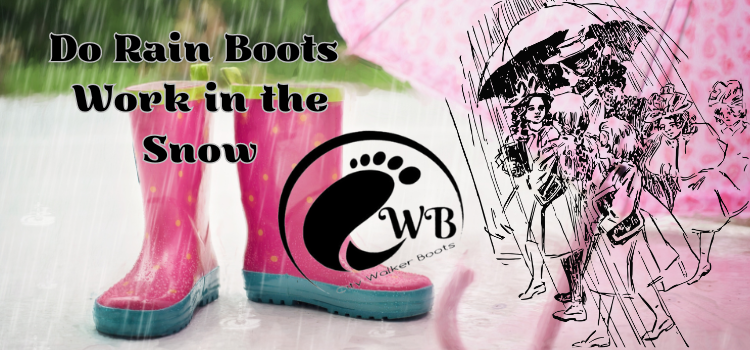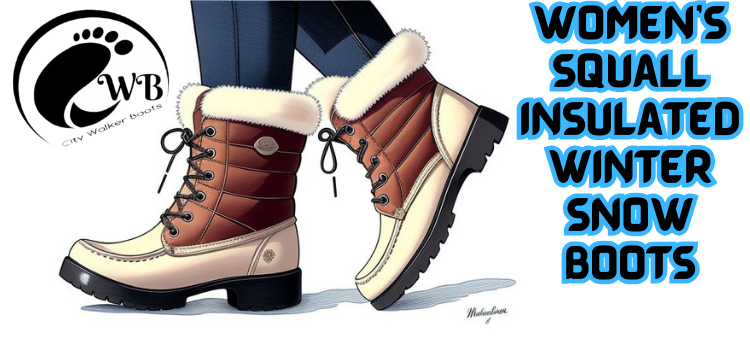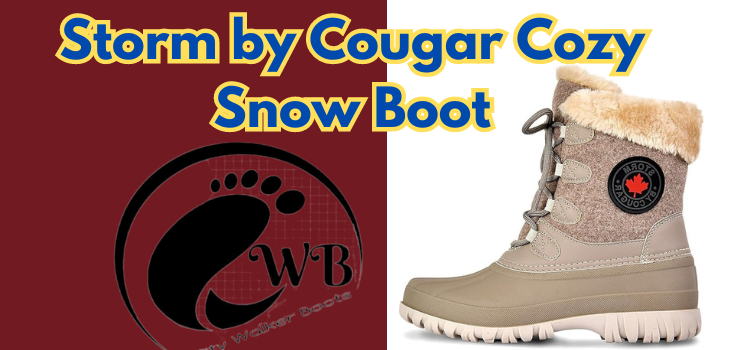Do Rain Boots Work in the Snow: The Winter-Worthy Footwear

As an Amazon Associate, I earn from qualifying purchases.
Rain boots, also known as Wellington boots or gumboots, usually serve to keep your feet dry and protected in wet weather. But what about snowy conditions? Is it possible to wear rain boots in the snow?
The answer is yes, you can wear rain boots in the snow. Although they may not be specifically designed for snowy conditions, rain boots can still function well and keep your feet dry in light to moderate snowfall. However, there are a few things to consider when opting for Snow-Compatible Rain Boots.
The Difference Between Rain Boots and Snow Boots
Rain boots and snow boots have some similarities, but there are also a few key differences. Snow boots are typically made from thicker materials and have a more insulated design to keep your feet warm in cold temperatures. They also tend to be taller, usually going up past your knee, while rain boots typically stop at mid-calf.
In terms of functionality, rain boots are typically more comfortable and flexible since they don’t have heavy insulation built-in. Snow boots, on the other hand, offer better traction on slippery surfaces due to their specialized outsoles.

Image Credit: www.walmart.com
Can Rain Boots Work in the Snow?
It’s totally fine to use rain boots in the snow, but they might not keep your feet as warm or offer as much traction as snow boots. Remember, rain boots aren’t made specifically for snowy conditions, so they might not give you the same protection or grip.
If you’re planning on wearing rain boots in the snow, make sure to put on warm socks and dress in layers to keep your feet comfortable. Also, be careful on icy surfaces because rain boots aren’t designed for extremely slippery conditions. Learn More: Can I Use Rain Boots in the Snow: Guide
How to Make Snow-Compatible Rain Boots!
If you want to wear Rain Boots in the Snow, there are a few things you can do to improve their functionality:
- Wear thick, warm socks to provide extra insulation.
- Add insoles or liners to provide additional warmth and cushioning.
- Consider using traction aids such as ice grips or snow chains to improve traction on slippery surfaces.
- Avoid deep snow or icy patches, as rain boots may not provide enough grip.
By taking these steps, you can make your rain boots more suitable for snowy conditions and still keep your feet dry.

Credit: www.amazon.com
Rain Boots in the Snow: Tips and Tricks
Insulating Insoles: Rain Boots in the Snow
Enhance the warmth of your rain boots by adding insulating insoles. This simple addition can make a significant difference in keeping your feet cozy in the snow.
Wear Thermal Socks: Rain Boots in the Snow
Pair your rain boots with thermal socks to boost insulation. Opt for moisture-wicking materials to keep your feet dry and warm.
Regular Maintenance: Rain Boots in the Snow
Keep your rain boots in top condition by regularly cleaning and treating them. Cracks or damages in the material can compromise their waterproof properties. Can I Use Rain Boots for Snow: Outlining the Essentials
Frequently Asked Questions Of Do Rain Boots Work In The Snow
What Is The Difference Between Rain Boots And Snow Boots?
Rain boots and snow boots have minor differences. Snow boots typically have thicker soles and are made of synthetic materials. They are taller, going above the knee, while rain boots stop at mid-calf. However, both are waterproof and suitable for snowy conditions.
Can Waterproof Boots Be Used In Snow?
Yes, you can wear waterproof boots in the snow. They are comfortable, waterproof, and functional, with a good tread to provide traction. Just ensure they can handle cold temperatures without cracking and wear heavy socks for added warmth.
How Do You Make Snow-Compatible Rain Boots?
To make rain boots into snow boots, add shearling insoles for extra warmth and insulation. The thicker sole of snow boots provides better traction in snowy conditions.
Can I Wear Rubber Shoes In Snow?
Yes, you can wear rubber shoes in the snow. They are waterproof and provide good traction. However, they may not provide as much insulation as snow boots, so you may want to wear thick socks to keep your feet warm.
Conclusion
Rain boots can handle snow, but they might not offer the same warmth and traction as snow boots. They work well in light to moderate snowfall and wet conditions. If you intend to wear rain boots in the snow, ensure you take appropriate precautions, like wearing warm socks and using traction aids if necessary.
Remember, it’s important to prioritize your safety and comfort when choosing footwear for snowy conditions. While rain boots can be a convenient option, investing in a pair of snow boots designed specifically for cold weather may offer better protection and grip. Are Hunter Boots Good in Snow? comprehensive guide
Ultimately, the choice between rain boots and snow boots will depend on the severity of the weather and the activities you plan on doing. Consider your specific needs and make an informed decision to ensure you stay warm, dry, and safe during snowy conditions.

